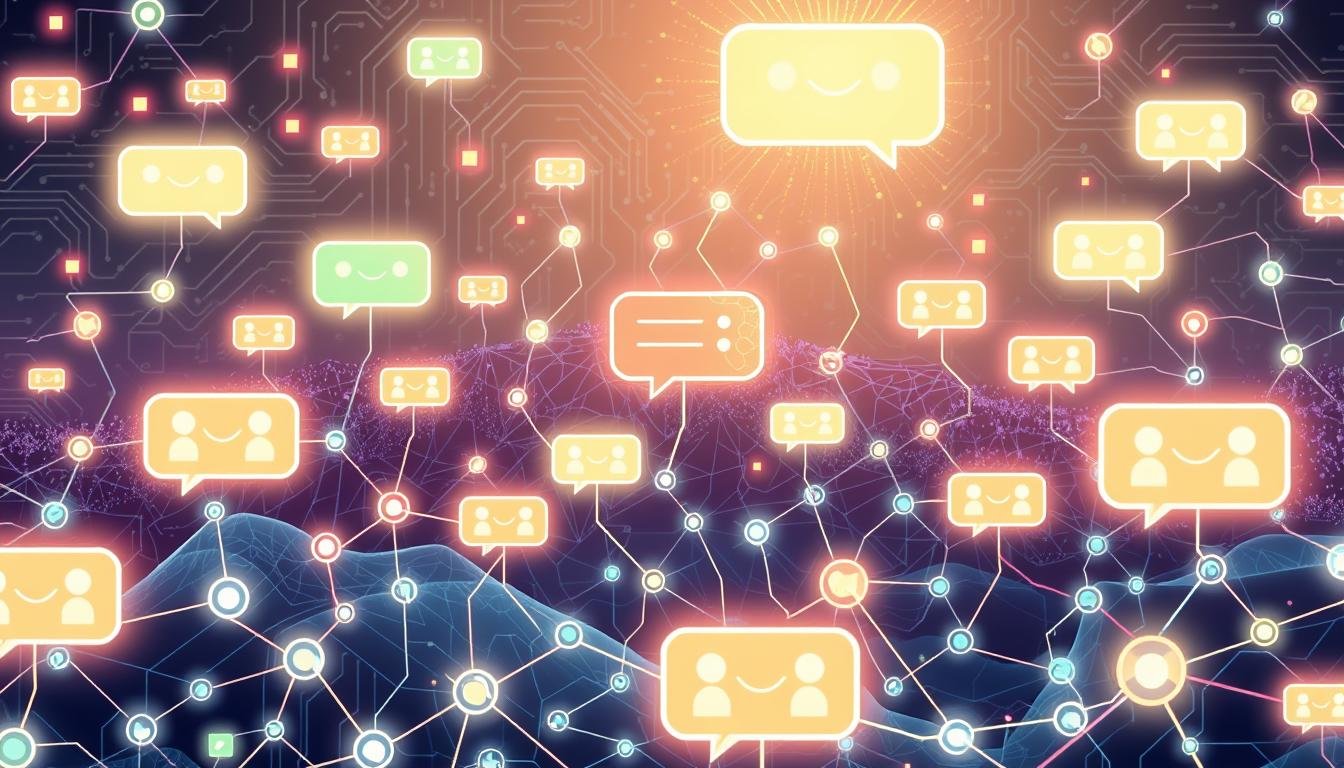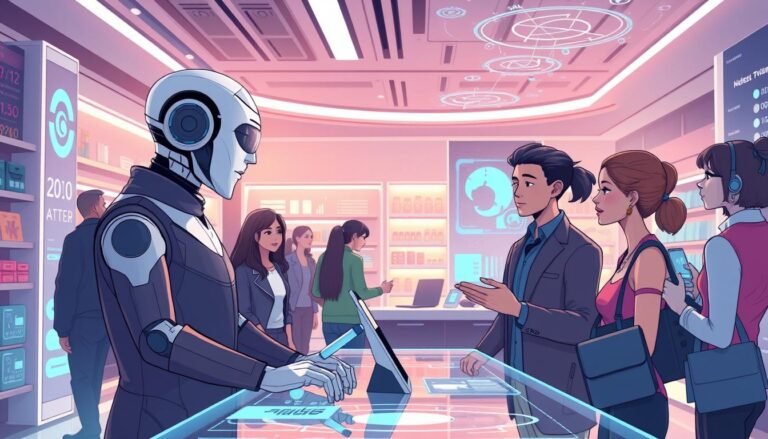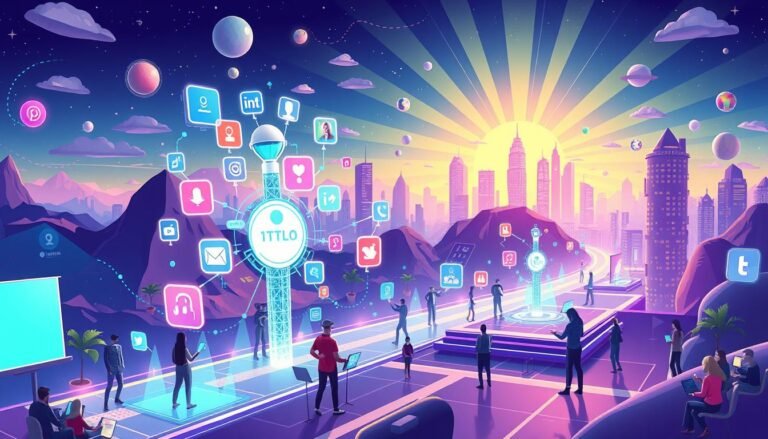AI-Powered Chatbots: New Capabilities and Use Cases
Can AI chatbots really provide the same personalized service as human agents?
Businesses are turning to AI chatbots more and more. These virtual assistants are changing how we talk to customers. They can understand complex questions and give answers that fit each person’s needs.
Companies in many fields are using AI chatbots. They help with automated answers, live chat, and more. This is part of a big change towards digital solutions.
Key Takeaways
- Businesses use AI chatbots to automate customer support, improving agent productivity and reducing costs.
- Providing 24/7 availability, AI chatbots enhance customer satisfaction through real-time query resolutions.
- AI chatbots automate routine tasks, relieving human agents from repetitive queries and boosting efficiency.
- By gathering and analyzing customer interaction data, AI chatbots offer valuable insights for data-driven decisions.
- AI chatbots are integrated across various channels, providing seamless omnichannel customer support.
Introduction to AI-Powered Chatbots
We are entering a time of fast tech changes, and conversational AI is key in business today. AI chatbots are advanced tools changing how companies talk to customers. They use tech like Natural Language Processing (NLP) and Machine Learning.
About half of marketers are new to AI, showing a big chance for learning and growth. Chatbots that handle AI customer service are changing business ways. They can talk like humans, thanks to over six billion conversations they’ve learned from.
Companies using AI chatbots see better customer talks, automated help, and always-on service. For example, Drift users can see a return on investment (ROI) of up to 670%. This shows how AI can really help a business’s bottom line.
Virtual customer assistants make talking to companies easy and fast. Chatbots could also make businesses a lot of money, with predictions of trillions of dollars a year. Using AI, companies can offer better service, work more efficiently, and make more money.
Key Technologies in AI-Powered Chatbots
In the world of AI chatbots, three key technologies are crucial. They are Natural Language Processing (NLP), machine learning, semantic search, and sentiment analysis tools. Each one helps the chatbot understand and talk to users better.
Natural Language Processing (NLP)
NLP is key for AI chatbots. It lets them understand and interpret language, making them seem more human. NLP helps the chatbot grasp the meaning behind words, improving the user’s experience.
Thanks to new models and learning methods, NLP is getting better. Now, chatbots can handle many conversations at once. This makes them more useful during busy times.
Machine Learning
Machine learning is at the heart of AI chatbots. It lets them learn from past talks and get better over time. This way, chatbots can guess what users need and make their interactions more personal.
Machine learning also makes chatbots more efficient. Big companies can save a lot of money by using chatbots. This is because chatbots can handle lots of conversations without needing humans.
Semantic Search
Semantic search is important for chatbots. It looks at the context of a question, not just the words. This means chatbots can understand what users really mean, giving them better answers.
With semantic search, chatbots can offer better experiences. They can also help businesses learn more about their customers. This is useful for sales and understanding trends.
Sentiment Analysis
Sentiment analysis is key for chatbots that want to connect with users. It lets chatbots know how users feel, so they can respond in a way that shows they care. This makes interactions more satisfying for users.
By understanding emotions, chatbots can focus on what users need. They can also know when to pass on complex questions to humans. This makes customers happier and more loyal.
Here is a detailed comparison of key capabilities of AI-powered chatbots:
| Technology | Core Function | Benefit |
|---|---|---|
| NLP | Understanding language nuances | Enhanced conversational abilities |
| Machine Learning | Continuous learning from interactions | Improved responsiveness and personalization |
| Semantic Search | Contextual query understanding | More accurate and relevant responses |
| Sentiment Analysis | Detecting user emotions | Empathetic and appropriate responses |
Benefits of AI-Powered Chatbots
AI-powered chatbots bring many benefits to businesses looking to improve customer service and operational efficiency. They can answer questions quickly and accurately, making customers happier. This 24/7 support means customers get help anytime, improving their experience.
Another big plus is how they reduce operational costs. By taking over routine tasks, businesses save on staff costs. This lets human workers focus on more important tasks.
AI chatbots can talk to many people at once, working fast. This means businesses can serve more customers without hiring more staff. It’s especially helpful in e-commerce, where keeping customers updated is key.
Chatbots also gather valuable data on what customers want and do. This info helps businesses improve their services and grow. Plus, they can give personalized advice, helping to keep customers from leaving without buying.
Using AI chatbots makes customer service better and boosts a brand’s image. As the chatbot market grows, businesses using them will see more loyal customers and profits.
These chatbots provide support any time, which is vital for keeping customers happy. In places like hotels and shops, this is a huge advantage. It helps businesses stay ahead and meet the demand for quick service.
AI-Powered Chatbots: New Capabilities and Use Cases
AI-powered chatbots are becoming key for businesses today. They bring new abilities that boost customer happiness and work efficiency.
Customer Service Automation
AI chatbots are changing customer service automation by taking over simple tasks. This means quicker answers and happier customers. Thanks to NLP, chatbots talk like humans, making interactions smoother.
Big names like ChatGPT Plus and Salesforce Einstein Copilot offer features for all sizes of businesses. They help from small startups to big companies.
Omnichannel Experiences
AI chatbots also make omnichannel support possible. They help businesses talk to customers on web, mobile, and social media. This way, customers get the same service everywhere.
Tools like Intercom Fin and Google’s Gemini keep the service consistent. This makes customers happy and loyal, as they can choose how to interact with brands.
Data-Driven Insights
AI chatbots collect and analyze lots of data. This gives deep AI insights for data-driven business decisions. For example, ChatGPT Plus and Zapier Central use AI to understand customer habits.
This data helps businesses predict trends and tailor services. It keeps them competitive and ahead in the market.
Challenges Facing AI-Powered Chatbots
AI-powered chatbots have many benefits, but they face several challenges. One big issue is privacy issues. Chatbots deal with sensitive information, making data security and privacy very important. Without strong security, users could face data breaches.
Another challenge is ethical concerns. These concerns come from how AI makes decisions and how transparent its algorithms are. It’s important to make sure AI is fair and accountable. This requires industry-wide standards and ethical guidelines.
Integration complexities also slow down AI adoption. Adding AI chatbots to existing systems is hard and takes a lot of resources. This can make deployment slow and expensive, causing some businesses to hesitate.
Building trust in AI chatbots is also a challenge. Many people prefer talking to humans because they worry about AI’s impersonal nature and mistakes. Companies need to show how AI chatbots can be helpful and available all the time to gain user trust.
Creating personalized and relevant responses is another challenge. Advanced NLP and machine learning are needed to understand different user queries. Improving these technologies is key to making chatbot interactions helpful and engaging.
In conclusion, the future of AI chatbots depends on solving these challenges. Businesses must handle ethical concerns, privacy issues, and integration complexities carefully. Overcoming these hurdles and creating trustworthy chatbots is crucial for AI’s success in various industries.
| Challenge | Description |
|---|---|
| Privacy Issues | Ensuring data security and protecting sensitive information from breaches. |
| Ethical Concerns | Addressing fairness, accountability, and transparency in AI decision-making. |
| Integration Complexities | Integrating AI with existing systems, which can be costly and time-consuming. |
| AI Adoption Hurdles | Overcoming user skepticism and convincing users of the benefits of AI chatbots. |
| Personalization | Improving NLP and machine learning to provide accurate and engaging responses. |
Conclusion
The future of AI chatbots looks very promising. They will keep getting better with new AI tech. This means chatbots will be even more valuable for businesses.
Studies have shown chatbots are key in many areas like healthcare, e-commerce, and customer service. They help a lot in these fields.
AI chatbots are already making a big difference. In healthcare, they help people live healthier by giving advice. They also save money and work well all the time.
Other businesses have seen big improvements too. They work better, save money, and make customers happier. Chatbots are also great at helping employees find answers quickly.
The future of AI chatbots is exciting. They will get even smarter, helping businesses grow. They will make customer experiences better and more personal.
By using these new technologies, businesses can stay ahead. They will offer better service and work more efficiently. This is key in today’s digital world.
Source Links
- AI Chatbots: Definition, Examples, and Use Cases
- Chatbots and Virtual Assistant Use Cases – Generative AI – AWS
- An Introduction to AI Chatbots and Natural Language Processing
- Defining AI and chatbots
- The Evolution of AI Chatbot Development with Key Trends and Future Prospects
- AI-Driven Enterprise Chatbots: Features and Key Use Cases
- What Is a Chatbot? | IBM
- AI-Powered Chatbots: The Benefits and Essential Features
- How AI Chatbots Are Improving Customer Service
- The best AI chatbots in 2024 | Zapier
- AI-Powered Chatbots: A Game Changer for Customer Service
- Top 10 Challenges to Chatbot Development – An In-depth look
- The Challenges of Using AI Chatbots: Problems and Solutions
- A systematic review of artificial intelligence-powered (AI-powered) chatbot intervention for managing chronic illness
- 9 Proven AI Chatbot Use Cases for Business in 2024








